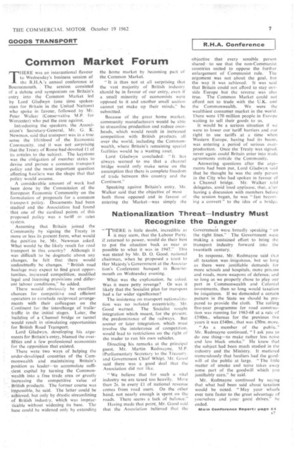Nationalization Threat—Industry Must Recognize the Danger
Page 9

If you've noticed an error in this article please click here to report it so we can fix it.
" THERE is little doubt, incredible as
it may seem, that the Labour Party. if returned to power, would do their best to put the situation back as near as possible to what it was in 1947." This was stated by Mr. D. 0, Good. national chairman, when he proposed a toast to Her Majesty's Government at the Association's Conference banquet in Bournemouth on Wednesday evening.
What was the explanation, he asked. Was it mere petty revenge? Or was it likely that the Socialist plan for transport had a far wider significance?
The insistence on transport nationalization was no isolated eccentricity. Mr. Good warned. The Socialist sought integration which meant, for the present. the predominance of the railways. But soOner or later integration, which must involve the intolerance of competition. would lead to restrictions on the right of the trader to run his own vehicles.
Directing his remarks at the principal guest, Mr. Martin Redmayne, (Parliamentary Secretary to the Treasury. and Government Chief Whip), Mr. Good said there was a good deal that the Association did not like.
"We believe that for such a vital industry we are taxed too heavily. More than 2s. in every £1 of national revenue comes from road users. On the other hand, not nearly enough is 'spent on the roads. There seems a lack of balance.
Having made that point, Mr. Good said that the Association believed that the
Government were. broadly speaking "on the right lines." • The Government were making a sustained effort to bring the transport industry forward into the twentieth century.
In response, Mr. Redrnayne said that all taxation was iniquitous, but so lone as there were justifiable demands for more schools and hospitals, metre prisons and roads, more weapons of defence, and so long as we properly chose to play our part in Commonwealth and Colonial investments, then so long would taxation be iniquitous. If we demanded a certain pattern in the State we should be prepared to provide the cloth. The rolling five-year programme for road construction was running for 1963-68 at a rate of £590m., whereas for the previous live years it was 1540m., that was 150m. more.
"As a member of the public." Mr. RedmaYne continued, "I ask you to do one thing—to make rather less noise and less black smoke." He knew that the subject had been much studied in the industry and the Ministry. It mattered tremendously that hauliers had the goodwill of the public at large. "The little matter of smoke and noise takes away some part of the goodwill which you justifiably earn," he said.
. Mr, Redmaync continued by saying that what had been said about taxation would be noted, "May your wheels ever turn faster to the great advantage of yourselves and your good drives," he ended.




































































































































